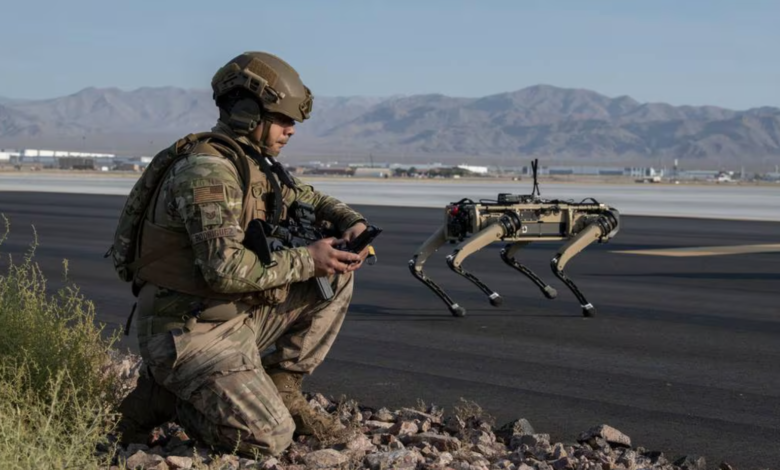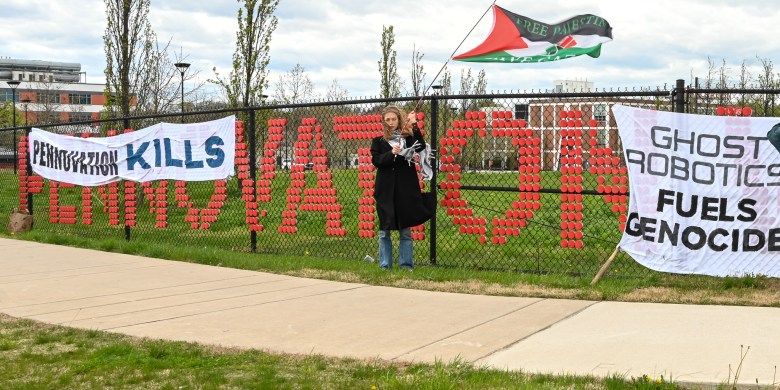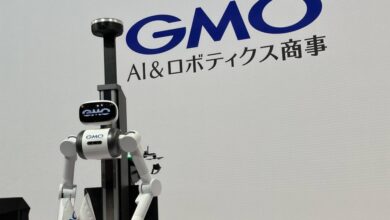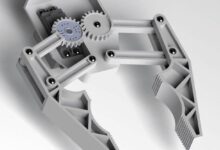Israel’s military is using robot dogs from Philly’s Ghost Robotics

The frequent pro-Palestinian marches and protests that activists have held in Philadelphia over the past few months have recently found a new target: Ghost Robotics.
The company designs and manufactures four-legged, dog-like mobile robots and is headquartered at the University of Pennsylvania’s Pennovation Works office and lab complex. The Israeli army has been using the company’s robots in the Gaza strip, according to news reports in the Haaretz newspaper and other sources.
At a protest on Penn’s campus earlier this month and a subsequent march through the streets of West Philadelphia, activists carried signs and put up banners with slogans like “Ghost Robotics fuels genocide.” They called on the university to boot the firm from Pennovation.
A member of a group called Shut Down Ghost Robotics said they are worried “that our tax dollars are subsidizing and that our campus is supporting the manufacture of these robotic dogs,” one protester told the Daily Pennsylvanian.
The company is one of several robotics and tech firms that have their roots in Penn’s GRASP Lab. (That’s short for General Robotics, Automation, Sensing and Perception Laboratory).
Unlike a number of other similar companies — such as its better-known robot-dog-making rival Boston Dynamics — Ghost Robotics has declined to sign on to pledges not to weaponize the devices. Instead, it’s leaned into military sales and embraced partnerships with other companies that install weapons on the robots.
“If it’s a weapon they need… we’re happy for them to do that”
Ghost Robotics’ flagship product is the Vision 60, a “quadrupedal unmanned ground vehicle” or QUGV. The company doesn’t call it a robot dog, but does say it “mimics how mammals operate across a range of urban and natural environments.”
The devices reportedly cost $165,000 apiece, have multiple cameras and microphones, and can get up on their own when they fall over. They’re designed to collect and feed information from sensors back to their operators, for example to use as targeting data by separate weapons systems.
The U.S. Air Force purchased Vision 60s to monitor base perimeters and the Department of Homeland Security is testing them to detect migrants at U.S borders. Japan’s military recently used the robots to help evacuate earthquake victims.
The company was founded in 2015 by Avik De, Gavin Kenneally, and Jiren Parikh. De and Kenneally were PhD students at Penn under roboticist Daniel Koditschek at the GRASP Lab. Several tech companies have spun off from GRASP, including Exyn Technologies, a drone maker for mining companies headquartered at 22nd and Washington in South Philly.
In October 2021. Ghost Robotics drew attention when it exhibited its robot dog at a military conference in Washington D.C. with another company’s remote-controlled rifle attached to its back. Parikh said the company supported the use of weapons on its products to protect employees of its military and intelligence agency customers.
“All we’re trying to do is allow them to use our robot in military and other government agency applications to keep our people from getting hurt,” he told a tech publication.
“If it’s a weapon that they need to put on our robot to do their job, we’re happy for them to do that. No different than any other dual use technology company that sells to defense or other government agencies,” he said. (Parikh passed away a few months later.)
The Campaign to Stop Killer Robots
Shortly after the display of the armed robot, GRASP Lab’s Koditschek released a letter asking Ghost Robotics to remove references to him and his group from the company’s website and literature. He wrote that its work to build an armed quadruped was an “affront” to his research team and “corrupts the very aims and nature of robotics research.”
“Integration of guns with the emerging agility and eventual ubiquity of small legged machines transgresses a crucial ethical barrier,” he wrote. “Military technology often falls into the hands of civilian authorities and police forces whose use of it may not be adequately constrained by existing law or ethical considerations.”
In 2022, industry leader Boston Dynamics — which is known for videos of its various dog-like and humanoid robots — and five other companies pledged not to weaponize their robots, and to try to prevent customers from doing so.
Weaponization “raises new risks of harm and serious ethical issues,” they wrote, and will “harm public trust in the technology in ways that damage the tremendous benefits they will bring to society.”

Separately, Boston Dynamics also sued Ghost Robotics, alleging the latter’s robot dog design encroaches on several of its patents. Ghost Robotics called the suit an “obstructive and baseless” attempt by its much larger competitor to “halt the newcomer’s progress.”
A central concern of weaponization opponents is that robots could be programmed to autonomously select targets and kill without direct control by a human operator. A coalition called the Campaign to Stop Killer Robots has noted Israel’s use of robot dogs in Gaza “with serious concern” and called for new laws regulating the use of autonomous weapon systems.
“Technologies of extermination”?
Members of the Shut Down Ghost Robotics campaign participated in an April 13 march organized by the Philly Palestine Coalition, which ended outside the firm’s offices at Pennovation. Ghost Robotics spokesperson Michael Subhan declined to comment on the protests.
One member of the Shut Down group alleged the company’s robot dogs are “used to dispose, displace and destroy homes in Gaza,” according to a report on the march in Workers World. Other critics of Israel’s actions in Gaza claim the robots are being tested as “technologies of extermination.”

Some of the previous anti-war and pro-Palestinian marches in Philadelphia have also targeted Day & Zimmermann, an arms manufacturer headquartered on Spring Garden Street.
News reports do not indicate that Ghost Robotics’ QUGVs are carrying weapons in Gaza, but they are apparently used in Israeli operations to find and capture or kill militants.
The military deploys them to surveil buildings, tunnels and open spaces to look for booby traps and enemy combatants, according to Haaretz. When the army searches for militants or hostages in Hamas’ extensive network of underground tunnels, the robot dogs can climb around garbage and other obstacles and send back video without risking harm to Israeli soldiers or real dogs.
In some cases the robots are used to carry another device, a drone called the Rooster made by the Israeli startup Robotican, per Haaretz. The drone can jump or fly over steps or through windows to enter buildings and identify hazards before soldiers follow.
However, the Wall Street Journal reported the Israeli military found the robot dogs heavy and expensive for tunnel operations, and prefers using small quadcopter drones that can fit in small spaces and create their own radio communication networks.


















